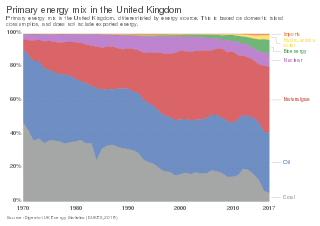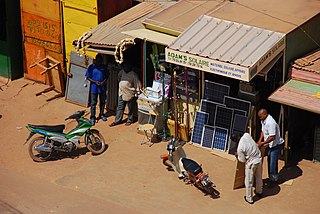
The poverty threshold, poverty limit, poverty line, or breadline is the minimum level of income deemed adequate in a particular country. The poverty line is usually calculated by estimating the total cost of one year's worth of necessities for the average adult. The cost of housing, such as the rent for an apartment, usually makes up the largest proportion of this estimate, so economists track the real estate market and other housing cost indicators as a major influence on the poverty line. Individual factors are often used to account for various circumstances, such as whether one is a parent, elderly, a child, married, etc. The poverty threshold may be adjusted annually. In practice, like the definition of poverty, the official or common understanding of the poverty line is significantly higher in developed countries than in developing countries.
National Energy Action (NEA) is a fuel poverty charity that works to eradicate fuel poverty and campaigns for greater investment in energy efficiency to help those who are poor or vulnerable gain affordable heat.

Microgeneration is the small-scale production of heat or electric power from a "low carbon source," as an alternative or supplement to traditional centralized grid-connected power.
Renewable heat is an application of renewable energy referring to the generation of heat from renewable sources; for example, feeding radiators with water warmed by focused solar radiation rather than by a fossil fuel boiler. Renewable heat technologies include renewable biofuels, solar heating, geothermal heating, heat pumps and heat exchangers. Insulation is almost always an important factor in how renewable heating is implemented.

The energy policy of the United Kingdom refers to the United Kingdom's efforts towards reducing energy intensity, reducing energy poverty, and maintaining energy supply reliability. The United Kingdom has had success in this, though energy intensity remains high. There is an ambitious goal to reduce carbon dioxide emissions in future years, but it is unclear whether the programmes in place are sufficient to achieve this objective. Regarding energy self-sufficiency, UK policy does not address this issue, other than to concede historic energy security is currently ceasing to exist.

Poverty in the United Kingdom is the condition experienced by the portion of the population of the United Kingdom that lacks adequate financial resources for a certain standard of living, as defined under the various measures of poverty.

In developing countries and some areas of more developed countries, energy poverty is lack of access to modern energy services in the home. Today, 759 million people lack access to consistent electricity and 2.6 billion people use dangerous and inefficient cooking systems. Their well-being is negatively affected by very low consumption of energy, use of dirty or polluting fuels, and excessive time spent collecting fuel to meet basic needs.
The energy policy of India is to increase the locally produced energy in India and reduce energy poverty, with more focus on developing alternative sources of energy, particularly nuclear, solar and wind energy. Net energy import dependency was 40.9% in 2021-22.

Renewable energy commercialization involves the deployment of three generations of renewable energy technologies dating back more than 100 years. First-generation technologies, which are already mature and economically competitive, include biomass, hydroelectricity, geothermal power and heat. Second-generation technologies are market-ready and are being deployed at the present time; they include solar heating, photovoltaics, wind power, solar thermal power stations, and modern forms of bioenergy. Third-generation technologies require continued R&D efforts in order to make large contributions on a global scale and include advanced biomass gasification, hot-dry-rock geothermal power, and ocean energy. In 2019, nearly 75% of new installed electricity generation capacity used renewable energy and the International Energy Agency (IEA) has predicted that by 2025, renewable capacity will meet 35% of global power generation.

Fossil fuel phase-out is the gradual reduction of the use and production of fossil fuels to zero, to reduce deaths and illness from air pollution, limit climate change, and strengthen energy independence. It is part of the ongoing renewable energy transition, but is being hindered by fossil fuel subsidies.

The National Energy Foundation (NEF) is an independent British charity, established to improve the use of energy in buildings.
Energy subsidies are measures that keep prices for customers below market levels, or for suppliers above market levels, or reduce costs for customers and suppliers. Energy subsidies may be direct cash transfers to suppliers, customers, or related bodies, as well as indirect support mechanisms, such as tax exemptions and rebates, price controls, trade restrictions, and limits on market access.

Renewable energy in developing countries is an increasingly used alternative to fossil fuel energy, as these countries scale up their energy supplies and address energy poverty. Renewable energy technology was once seen as unaffordable for developing countries. However, since 2015, investment in non-hydro renewable energy has been higher in developing countries than in developed countries, and comprised 54% of global renewable energy investment in 2019. The International Energy Agency forecasts that renewable energy will provide the majority of energy supply growth through 2030 in Africa and Central and South America, and 42% of supply growth in China.

Bioliquids are liquid fuels made from biomass for energy purposes other than transport.
In the United Kingdom, there are different definitions of fuel poverty. In England, a household is considered to be in fuel poverty if they are living in a property with an energy efficiency rating of band D or below, and if after heating their home to an adequate level, they fall below the official poverty line. In Northern Ireland, Scotland, and Wales, the definition of fuel poverty is whether a household needs to spend more than 10% of their income on energy bills to heat their home to an adequate level of warmth.To be considered adequate, the main living room needs to be 21 °C (70 °F), and other occupied rooms 18 °C (64 °F) during the daytime, with lower temperatures allowed at night.

Energy policy of Finland describes the politics of Finland related to energy. Energy in Finland describes energy and electricity production, consumption and import in Finland. Electricity sector in Finland is the main article of electricity in Finland.
Energy poverty is defined as lacking access to the affordable sustainable energy service. Geographically, it is unevenly distributed in developing and developed countries. In 2019, there were an estimated 770 million people who have no access to electricity, with approximately 95% distributed in Asia and sub-Saharan Africa.
Brenda Boardman MBE is a research fellow at University of Oxford and a campaigner against fuel poverty. She provided the evidence and theory base for measuring the energy inefficiency of houses, coined the term 'affordable warmth' and has influenced UK government policy in this area.
Since late 2021, the prices for many essential goods in the United Kingdom began increasing faster than household incomes, resulting in a fall in real incomes. This is caused in part by a rise in inflation in both the UK and the world in general, as well as the economic impact of issues such as the COVID-19 pandemic, Russia's invasion of Ukraine, and Brexit. While all in the UK are affected by rising prices, it most substantially affects low-income persons. The British government has responded in various ways such as grants, tax rebates, and subsidies to electricity and gas suppliers.
The Great British Insulation Scheme (GBIS) is an initiative launched by the UK government to enhance efficient energy use in residential properties. The scheme initially consulted on by the Department for Energy Security and Net Zero labelled as ECO+, reflects the UK's efforts towards environmental sustainability and the reduction of household energy costs.










